|
|
|
Sort Order |
|
|
|
Items / Page
|
|
|
|
|
|
|
| Srl | Item |
| 1 |
ID:
163352
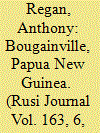

|
|
|
|
|
| Summary/Abstract |
This article asks whether the experience of a successful peace process such as the one that has brought more than 20 years of peace to Bougainville offers lessons for other peace processes. Anthony Regan shows that while the strong emphasis in the cultures of Bougainville and of Papua New Guinea on reconciliation as a means of ending conflict cannot be readily replicated, an aspect of the peace process that could be considered for use elsewhere is the Peace Agreement offering implementation incentives to opposing parties.
|
|
|
|
|
|
|
|
|
|
|
|
|
|
|
|
| 2 |
ID:
118576
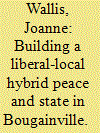

|
|
|
|
|
| Publication |
2012.
|
| Summary/Abstract |
There has been an increasing attempt to theorise the emergence of a liberal-local hybrid approach to state-building, which recognises the coexistence and interaction of liberal and local socio-political institutions. There has not yet been a sustained attempt to understand what occurs when a liberal-local approach is adopted from the outset of a state-building operation. This article seeks to fill this gap by applying the literature to the state-building process in Bougainville, an autonomous region of Papua New Guinea.
|
|
|
|
|
|
|
|
|
|
|
|
|
|
|
|
| 3 |
ID:
058969
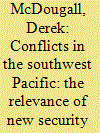

|
|
|
|
|
| Publication |
Aug 2004.
|
| Summary/Abstract |
In recent years the two major conflicts affecting the island countries of the Southwest Pacific have been in Bougainville and Solomon Islands. After reviewing the ways in which these conflicts have developed, this article asks whether any of the new perspectives in security studies are relevant to these situations. The broadening in scope suggested by terms such as 'comprehensive security' and 'human security' is helpful in this respect. Some of the insights from more particular approaches such as the 'new wars' thesis and the literature relating to the role of economic factors in civil wars are useful. The concept of state failure is helpful for understanding the situation that has developed in Solomon Islands. Some of the issues in the broader discussion about international intervention have a bearing on both Bougainville and Solomon Islands.
|
|
|
|
|
|
|
|
|
|
|
|
|
|
|
|
| 4 |
ID:
168267
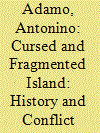

|
|
|
|
|
| Summary/Abstract |
This paper is a review piece examining the main factors responsible for the civil war, lasting from 1988 to 1998, on Bougainville island, an autonomous region in Papua New Guinea. History, economy, and social aspects of the island – especially traditional society features, mining activities, the effects of colonization and industrialization – are highlighted. The aim of the article is to identify which factors best explain the outbreak of the conflict. The main assumption is that no single factor can explain the civil war, as these elements require a comprehensive analysis. The ‘resource curse’ theory, i.e. the presence of natural resources leading to economic failure, and the existence of ethnic cleavages, are proposed as explanations, although further factors must also taken into account. Finally, the analysis helps to contextualize the unfolding events in Bougainville and its path to democratization.
|
|
|
|
|
|
|
|
|
|
|
|
|
|
|
|
| 5 |
ID:
170286
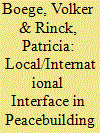

|
|
|
|
|
| Summary/Abstract |
In this article, internationally supported peacebuilding is conceptualized as a cross-cultural relational endeavour, with international and local actors engaged in multiple forms of interactions in a local everyday context. Using a cultural-relational approach, two cases of peacebuilding are presented: Bougainville and Sierra Leone, which are at opposite poles of the spectrum of international-local peacebuilding interaction. Peacebuilding on Bougainville has drawn relatively little attention; the international intervention there was modest and small in size, and locals had considerable control of the peace process. By contrast, Sierra Leone is one of the best-known cases of peacebuilding, with massive external engagement and comprehensive external control. Both cases are considered success stories, but they differ considerably due to the differences in local-international relations. This is explained by focusing on two interrelated core aspects of the local-international interface: building relationships and trust, and security provision. Furthermore, another generally underestimated dimension of peacebuilding is explored, namely culturally different understandings of the spiritual realm and their effects on peacebuilding interventions.
|
|
|
|
|
|
|
|
|
|
|
|
|
|
|
|
| 6 |
ID:
122816
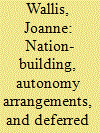

|
|
|
|
|
| Publication |
2013.
|
| Summary/Abstract |
After a protracted war of secession in 2001, the Bougainville region of Papua New Guinea was granted autonomy and deferred a referendum on its political future. This article argues that the Bougainville case highlights the challenges posed by attempts to settle self-determination disputes using these tools. It considers the challenges posed by deferred referendums, principally how to reconcile competing interpretations of the identity and future political status of the region. It also considers the challenges posed by attempts to negotiate the relationship between the unique identities of autonomous regions and their identities within the larger state.
|
|
|
|
|
|
|
|
|
|
|
|
|
|
|
|
| 7 |
ID:
102497
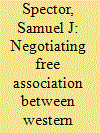

|
|
|
|
|
| Publication |
2011.
|
| Summary/Abstract |
The proposal of new negotiation formulae in the midst of stalemated conflicts can help to reframe the problem and restart dialogue. They can also unleash new controversy. The Moroccan Initiative for Negotiating an Autonomy Statute for the Sahara Region is a formulaic proposal advanced by Morocco to describe the broad outlines for Sahrawi autonomy under Moroccan sovereignty. It has been the subject of debate within the international community since it was first introduced in April 2007. Until now, however, discussion of its efficacy as a formulaic basis for a negotiated resolution to the Western Sahara dispute has largely outweighed serious consideration of how the proposal relates to current understandings of international law concerning self-determination and free association. Like Western Sahara, the Cook Islands, Niue, Aceh, New Caledonia, and Bougainville are cases of non-self-governing territories and other high autonomy arrangements where there has been recognition of the need to substitute, as the basis for ending the conflict, a comprehensive negotiated political status, in place of frequently unworkable or unattractive alternatives such as a contentious referendum on independence, open-ended talks, or continued armed conflict. In light of the lessons learned from actual state practice and international responses in the foregoing cases, an assessment of the present Moroccan proposal demonstrates that with some improvements, it may offer a viable new starting point for negotiations. The result of using this plan as a formula to restart negotiations can be the attainment for Western Sahara of a full measure of self-government - in a manner consistent with international law - by means of free association.
|
|
|
|
|
|
|
|
|
|
|
|
|
|
|
|
| 8 |
ID:
143921
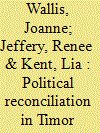

|
|
|
|
|
| Summary/Abstract |
In recent years, the study and practice of political reconciliation has experienced a turn to hybridity. This turn has been defined by the increased rate at which liberal international and local peacebuilding practices, and their underlying ideas, have become merged, integrated or co-located in time and space. While hybrid approaches to reconciliation have been praised as an effective means of engaging local populations in peacebuilding operations, little attention has been paid to examining whether or not they also bring unintended negative consequences. Drawing on the cases of Timor Leste, Solomon Islands and Bougainville, this article examines the potentially dark side of hybridity. It demonstrates that, in each of these cases, hybrid approaches to political reconciliation have brought both positive and negative consequences. On the positive side of the equation, hybridity has seen imported international approaches to reconciliation adapted to meet local demands and ensure resonance with local populations. On the negative side, however, the misappropriation and instrumentalisation of local practices within hybrid approaches has served to damage their legitimacy and to jeopardise their contributions to reconciliation. The article thus concludes that the existence and extent of this dark side necessitates a re-evaluation of how hybrid approaches to political reconciliation are planned and implemented.
|
|
|
|
|
|
|
|
|
|
|
|
|
|
|
|
| 9 |
ID:
165123
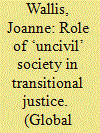

|
|
|
|
|
| Summary/Abstract |
Transitional justice (TJ) scholarship and practice often pins much hope on civil society. It generally assumes that civil society organisations demonstrate ‘civility’, have broad-based memberships, support liberal democratic values and promote TJ approaches based on liberal-legal justice strategies. Yet there is nothing inherently virtuous about civil society and in conflict-affected societies it often lacks these desired properties; it can be underdeveloped, unruly and disruptive. So, what role do, and should, ‘uncivil’ society groups play in TJ processes? To answer this question this article uses comparative case studies of the role of uncivil society groups in Bougainville and Timor-Leste. These cases exhibit similar broad cultural, socio-political and socio-economic characteristics. In both cases uncivil society groups are organised around societal divisions, attempt to operate as alternatives to the state, oppose liberal democracy and liberal-legal TJ processes and engage in unruly behaviour, including violence and criminality. These uncivil society groups are not regarded as internationally legitimate, but they nevertheless have strong local legitimacy, particularly when the state is absent or weak. Consequently, this article concludes that in conflict-affected societies it is necessary to engage with groups regarded as both civil and uncivil to promote locally legitimate and effective TJ, and peace more broadly.
|
|
|
|
|
|
|
|
|
|
|
|
|
|
|
|
| 10 |
ID:
111175
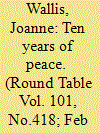

|
|
|
|
|
| Publication |
2012.
|
| Summary/Abstract |
Between 1989 and 1997 Bougainville endured a complex secessionist war and localised conflict in which it is estimated that as much as 10% of its population died and up to 40% were internally displaced. In light of the extreme scale of the destruction wrought by the war, it is somewhat surprising how successful the peace process has been. In 2001 a comprehensive political settlement, outlined in the Bougainville Peace Agreement, granted Bougainville extensive political autonomy and guaranteed that a referendum would be held on its political future 10-15 years after an autonomous government was formed. By 2005 Bougainvilleans had worked together to conduct a weapons disposal process, draft a constitution and establish the Autonomous Bougainville Government (ABG). This article considers the progress that Bougainville has made implementing autonomy by evaluating the performance of the ABG. It concludes by foreshadowing Bougainville's future prospects, including the role that autonomy and the deferred referendum have played in settling the self-determination dispute.
|
|
|
|
|
|
|
|
|
|
|
|
|
|
|
|
| 11 |
ID:
074527
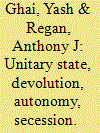

|
|
|
|
|
|
|
|